
Tesla filed an application with the Federal Communications Commission to use radio frequencies with a Session Initiation Protocol (SiP) module earlier this year. SiP modules signal and control multimedia communications sessions over the internet, including but not limited to voice and video calls and SMS messaging. The SiP module includes a Qualcomm Atheros QCA6234 chip optimized as a Wi-Fi hot spot and a USB/Bluetooth/Wi-Fi hub.
The FCC request included plans to introduce the module in Tesla vehicles beginning in the first quarter of the year. Electrek noted that Tesla launched a refreshed version of the Model S a few weeks after the end of the first quarter on March 31. It seems likely that the Wi-Fi hot spot module is installed Model S and Model Xs manufactured since that time.
Tesla has not publicly introduced the hot spot hardware. All Teslas sold so far have come with internet data service for four years at no additional charge. Electrek assumes there will be a data connection charge once the initial four-year period is up. Because the first Model S production units were sold in June 2012, that period has already passed in some cases. There is, therefore, no guarantee of an announcement date for in-vehicle mobile hot spot service, which Tesla would turn on via an OTA (over-the-air) software update. An in-vehicle hot spot for all passengers and their devices could be a value-add to sweeten the pot.
Tesla drivers will have even greater use for Wi-Fi hot spots when Teslas reach SAE level 4 autonomy — the level where drivers aren’t involved at all in the driving under select conditions. After that point, drivers and passengers will all expect internet connectivity in the car just as they now expect it at home and at work.



